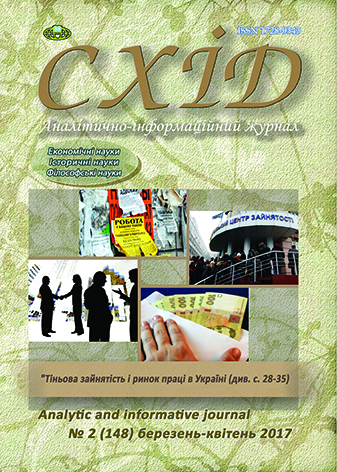Neototalitarianism as an ideological phenomenon: cultural discourse
DOI:
https://doi.org/10.21847/1728-9343.2017.2(148).102806Keywords:
neototalitarianism, Other, deconstructions, "wound erection", gestalt, global village, virtual terrorism, Synoptykon, ideological kitsch, Quasi-religiosity, populist elitismAbstract
Our research is devoted to analysis of neototalitarianism. We base our study on the new non-classic culturological methodology. When we say about "new totalitarianism" we mean radicalization of postmodern society through wars and ideologies. Classic totalitarianism is a phenomenon that is sufficiently studied in classical humanities. The main features of totalitarianism are already defined. These are: cult leader and one-party political system. These features are not inherent in the new totalitarianism. Researchers difficult to diagnose it because of its diffuse nature. The new totalitarianism investigates specific to global culture and processes of informatization. We interpret it as cultural sense that formed the collective unconscious. We refer discourse Real, which is protected under the Symbolic - a system of ideological narratives. We need a new methodology to study the new totalitarianism. This methodology must be differed from classical social philosophy and psychology. This methodology can provide Cultural science. We mean: cultural studies (Birmingham and the Montreal school), structural and cultural psychoanalysis of the pathography of movie by J. Lacan and S. Zizek, post-structuralism, media theory and post-industrial society, known as the "alter-globalization", "glokalizm" "antiglobalization". These concepts help to show: a new totalitarian mentality formed in a conflict of cultures as virtual manipulation strategy.
The aim of our study is the semantic diagnosing of classical and non-classical philosophical symptoms of a new totalitarianism (neototalitarianism) in interdisciplinary cultural discourse, which includes non-classical ideas of psychoanalysis and social philosophy. Implementation objective defines the following research objectives: to identify the classic signs of a new totalitarianism, which brings him to the totalitarian tendencies of past eras based on previous cultural reflection of the totalitarian regimes of the twentieth century; to identify and disclose non-classical features of the neototalitarianism through our own experience based on postmodern culture; to demonstrate, how the semantic identifying aspects of classical and non-classical features of neo-totalitarian ideology do in the radical rightwing version of the new totalitarianism (nationalist, chauvinist, Nazi).
Based on the synthesis of these concepts, we have solved the traditional and new ideological lines of new totalitarianism as an expression of the desire for domination. Traditional characteristics: integrity, binary, xenophobia, Quasi-religiosity, humor negation / knowledge and paternalism. The newest features: fetishization of power as spectacle within the absolute transparency of private life (Synoptykon); terrorism virtual global village, and self-censorship "internal topics"; ideological kitsch and elitist populism. A clear manifestation of right radical nationalism is based on the romantic concept of gestalt. Inherent to it reduction identities, homogenization and isolationism contrary semiosfery global society.Downloads
References
Bauman, Zygmunt (2000), Liquid modernity, Polity Press, Cambridge, 234 p. (eng).
Zizek, S. (2009), Virtual reality: video lecture, available at: https://www.youtube.com/watch?v=aDI1EKSAfQ4.
Kundera, Milan (2014), The Unbearable Lightness of Being [translat.], Azbuka-Attikus, St.Petersburg, 352 p. (rus).
Bauman, Zygmunt (2004), Globalization. Consequences for man and society [translat.], “Ves mir” Publishing, Moscow, 188 p. (rus).
Eco, Umberto (2003), Five essays on the topic of ethics, Symposium, St.Petersburg, 96 p.
Herzogenrath, Bernd (1999), Lynch and Lacan, Cinema and Cultural Pathology, Other Voices, v.1, n.3 (January), available at: http://www.othervoices.org/1.3/bh/highway.php
Beck, W. (2016), What is globalization: The shock of globalization (belated discussion), available at: http://portal21.ru/news/we_recommend.php??ELEMENT_ID=8361.
Halberstam, Michael (2016), Totalitarianism as a Problem for the Modern Conception of Politics, Political Theory, Vol. 26, Issue 4, pp. 459-488. DOI: 10.1177/0090591798026004002
Geyer, Michael and Fitzpatrick, Sheila [ed.] (2008), Beyond totalitarianism: Stalinism and Nazism compared, Cambridge University Press, N.Y., 536 p. DOI: 10.1017/CBO9780511802652
Baehr, Peter (2010), Hannah Arendt, totalitarianism, and the social sciences: critical encounters, Stanford University Press, Stanford, Calif., DOI: 10.11126/stanford/9780804756501.003.0005
Downloads
Published
How to Cite
Issue
Section
License
Copyright (c) 2017 Yevheniia Bilchenko

This work is licensed under a Creative Commons Attribution-NonCommercial-NoDerivatives 4.0 International License.
1. Authors bear responsibility for the accuracy of facts, quotations, numbers and names used.
2. Manuscripts are not sent back.
3. The publisher does not always agree with the authors' opinion.
4. The authors reserve the right to authorship of the work and pass the first publication right of this work to the journal under the terms of a Creative Commons Attribution-NonCommercial-NoDerivatives 4.0 International License. This license allows others to distribute (copy) the published work for non-commercial purposes, provided there is mandatory attribution to its authors and a link to the first publication in our journal.
5. The authors have the right to conclude separate supplement agreements that relate to non-exclusive work distribution in the form in which it has been published by the journal (for example, to upload the work to the online storage of the journal or publish it as part of a monograph), provided that the reference to the first publication of the work in this journal is included.

